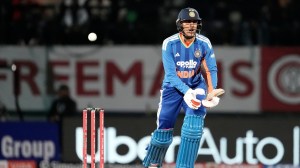Rajiv & Shah Bano in mid-1980s to Modi in 2024: Why Uniform Civil Code is back on the frontburner
Does the UCC have the kind of traction today it did in the ’80s when it also got linked to the construction of the Ram Mandir? It will undoubtedly spread disquiet among the minority and other communities. Will it galvanize the BJP’s base?
 PM Modi’s words in Bhopal are a signal that if he returns in 2024, UCC is on his agenda — just as abrogating Article 370 was, in less than three months of coming to power in 2019. (File Photo)
PM Modi’s words in Bhopal are a signal that if he returns in 2024, UCC is on his agenda — just as abrogating Article 370 was, in less than three months of coming to power in 2019. (File Photo) Less than a week after Prime Minister Narendra Modi struck several high notes at the US Congress in Washington, speaking of technology transfer, defence and space, and looking ahead at creating a new world order, back at home in Bhopal, he reverted to a well-worn theme of the ’80s, complex and divisive —the need for a uniform civil code.
In the mid ’80s, it had unleashed forces which finally devoured the government of Rajiv Gandhi who had come to power with an unprecedented 414-member majority in the Lok Sabha.
Modi works towards winning a third term in office riding on India gaining “izzat” on the world stage as a growing economy and a geo-political entity to counter China. That’s why it’s not clear if his words at the “Mera booth sabse mazboot” conclave of party workers in Bhopal betray confidence or insecurity— or a bit of both.
“Confidence” that the BJP is ready to face the big battle on its own and can pursue its unfinished core agenda of enacting the Uniform Civil Code, not worrying about the sensibilities of its allies – because it doesn’t need allies. Or “insecurity,” because, for all the talk of vikas and izzat, it needs to fall back on its old, divisive tropes hoping to drive the familiar Hindu-Muslim wedge once again.
Some reasons for the BJP flagging off UCC are obvious. Targeting the “other” always works better in garnering votes –and a Hindu-Muslim binary pushes the Opposition into the minority bracket, show that they are not in sync with Hindu interests.
The UCC may also energise the BJP cadre, flagging after nine years in power. The roti-dal issues of price rise, few jobs for the young, pale before emotional, religious divides.
And, finally, there is the RSS.
Already shrunk and pushed to the margins given the PM’s formidable popularity, the push for a UCC keeps the uneasy sections in the Sangh on the BJP side in the 2024 battle – after all, the promise that a third term will fulfil the last of the Sangh’s core agenda before 2025, when the RSS celebrates 100 years of its existence, is a powerful lure.
There’s a risk, too.
The fact is that, of late, the BJP is also trying to recreate the NDA, with old and new allies. Of course, as a functionary of the RSS put it, “You cannot rely only one plan to win a battle, it takes multiple strategies to win a war”. But since the Prime Minister has a “Jo Modi bolta hai woh karta hai” reputation, he may find it more difficult than Atal Behari Vajpayee did to put the UCC on the back-burner in case he needs to stitch up an arithmetic.
Clearly, Modi’s words in Bhopal are a signal that if he returns in 2024, UCC is on his agenda — just as abrogating Article 370 was, in less than three months of coming to power in 2019.
Of course, the BJP leadership may calculate that its regional allies may not react strongly against the UCC which is, after all, a commitment in the Constitution and part of the Directive Principles of state policy — and it promises greater equality to women, be it on divorce, or succession or in property laws. So the leadership may be able to ride both horses simultaneously.
Does the UCC have the kind of traction today it did in the ’80s when it also got linked to the construction of the Ram mandir? It will undoubtedly spread disquiet among the minority and other communities. Will it galvanize the BJP’s base?
Both Muslims and Hindus had strongly reacted to the Shah Bano judgment in April 1985. Shah Bano, a 62-year-old Muslim woman, had been divorced by her husband after 45 years of marriage, and went to court for maintenance. The court’s order that she be paid maintenance was seen by many Muslims as an interference in their personal laws. Under pressure from the community, the then PM, Rajiv Gandhi, enacted the Muslim Women (Protection of Rights on Divorce) Bill to undo the Shah Bano judgement.
The Hindus saw this as an appeasement of the Muslim community. In order to strike a balance and placate unhappy Hindus, Rajiv Gandhi facilitated the opening of the locks at the Babri Masjid to allow Hindus unfettered access to the idol of Ram Lalla which had been placed there surreptitiously in 1949.
Electorally, Rajiv’s actions did not cut ice with either the Muslims or the Hindus, and finally led to VP Singh replacing him as PM in 1989—and spawned a politics which enabled the BJP to rise and rise.
Today, many in the Sangh family believe that the idea of equality — the law being equal for all — will have national resonance and also polarise the voters on lines of faith.
Even during the Shah Bano controversy, a common argument was that while reforms in personal law were desirable, the demand should come from the community itself rather than being imposed on it by the courts or the government.
While there is merit in this argument, particularly in a country as diverse as India, it is also a fact that there’s been hardly any voice for reform in the community.
A Bohra Muslim woman in Pune, who lost her husband recently, told me that she will have to share her husband’s property with his larger family they had hardly seen over the years because they did not have children and she had had a call for money from his niece settled in Pakistan!
The issue of UCC is a complex one. It will be difficult for any government to enact it, more so a government which openly talks of safeguarding and championing Hindu interests — with the minorities feeling insecure.
Shah Bano finally declined to accept maintenance because she came under huge pressure from her own community. Of course, while she became a political ping pong, the court verdict in her case made things easier for other Shah Banos who followed her. And the law criminalizing triple talaq has also been enacted.
Having said that, the uniform civil code, desirable as it is, needs thought, consultations with all stakeholders, brainstorming, and pre-planning. That’s easier said than done when the drumbeats have started for the battle of 2024.
(Neerja Chowdhury, Contributing Editor, The Indian Express, has covered the last 10 Lok Sabha elections)
- 01
- 02
- 03
- 04
- 05






























